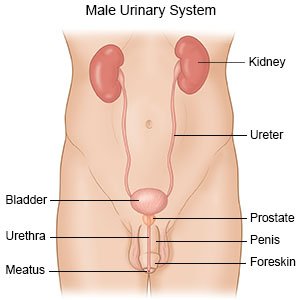Urinary Tract Infection in Men
Medically reviewed by Drugs.com. Last updated on Aug 4, 2025.
What is a urinary tract infection (UTI)?
A UTI is caused by bacteria that get inside your urinary tract. Your urinary tract includes your kidneys, ureters, bladder, and urethra. A UTI is more common in your lower urinary tract, which includes your bladder and urethra.
 |
What increases my risk for a UTI?
- A urinary catheter or self-catheterization
- Incontinence (not able to control when you urinate)
- Urinary tract problems, such as narrowing, kidney stones, or not being able to empty your bladder completely
- Not being circumcised
- Past UTI or urinary tract surgery
- Older age
- Obesity or diabetes
What are the signs and symptoms of a UTI?
- Urinating more often than usual, leaking urine, or waking from sleep to urinate
- Pain or burning when you urinate
- Pain or pressure in your lower abdomen or back
- Urine that smells bad
- Blood in your urine
How is a UTI diagnosed?
Your healthcare provider will ask about your signs and symptoms. Your provider may press on your abdomen, sides, and back to check if you feel pain. You may need any of the following:
- Urinalysis will show infection and your overall health.
- Urine cultures may show which germ is causing your infection.
How is a UTI treated?
- Antibiotics treat a bacterial infection.
- Medicines may be given to decrease pain and burning when you urinate. They will also help decrease the feeling that you need to urinate often. These medicines may make your urine orange or red.
Treatment options
The following list of medications are related to or used in the treatment of this condition.
What can I do to prevent a UTI?
- Empty your bladder often. Urinate and empty your bladder as soon as you feel the need. Do not hold your urine for long periods of time.
- Drink liquids as directed. Ask how much liquid to drink each day and which liquids are best for you. You may need to drink more liquids than usual to help flush out the bacteria. Do not drink alcohol, caffeine, or citrus juices. These can irritate your bladder and increase your symptoms. Your healthcare provider may recommend cranberry juice to help prevent a UTI.
- Urinate after you have sex. This can help flush out bacteria passed during sex.
- Do pelvic muscle exercises often. Pelvic muscle exercises may help you start and stop urinating. Strong pelvic muscles may help you empty your bladder easier. Squeeze these muscles tightly for 5 seconds like you are trying to hold back urine. Then relax for 5 seconds. Gradually work up to squeezing for 10 seconds. Do 3 sets of 15 repetitions a day, or as directed.
Related medications
When should I seek immediate care?
- You are urinating very little or not at all.
- You have a high fever with shaking chills.
- You have side or back pain that gets worse.
When should I call my doctor?
- You have a fever.
- You do not feel better after 2 days of taking antibiotics.
- You are vomiting.
- You have new symptoms, such as blood or pus in your urine.
- You have questions or concerns about your condition or care.
Care Agreement
You have the right to help plan your care. Learn about your health condition and how it may be treated. Discuss treatment options with your healthcare providers to decide what care you want to receive. You always have the right to refuse treatment. The above information is an educational aid only. It is not intended as medical advice for individual conditions or treatments. Talk to your doctor, nurse or pharmacist before following any medical regimen to see if it is safe and effective for you.© Copyright Merative 2025 Information is for End User's use only and may not be sold, redistributed or otherwise used for commercial purposes.
Learn more about Urinary Tract Infection
- Antibiotic Resistance: The Top 10 List
- Antibiotics 101: Common Names, Types & Their Uses
- Antibiotics For UTI Treatment - What Are My Options?
- Antibiotics and Birth Control Pill Interactions
- Anticholinergic Drugs to Avoid in the Elderly
- Can You Drink Alcohol with Antibiotics?
- Common Side Effects from Antibiotics, and Allergies and Reactions
- Why Don’t Antibiotics Kill Viruses?
Treatment options
Care guides
- Interstitial Cystitis
- Kidney Infection
- Nonspecific Urethritis in Men
- Prostatitis
- Urinary Tract Infection in Children
- Urinary Tract Infection in Women
Symptoms and treatments
Medicine.com guides (external)
Further information
Always consult your healthcare provider to ensure the information displayed on this page applies to your personal circumstances.
